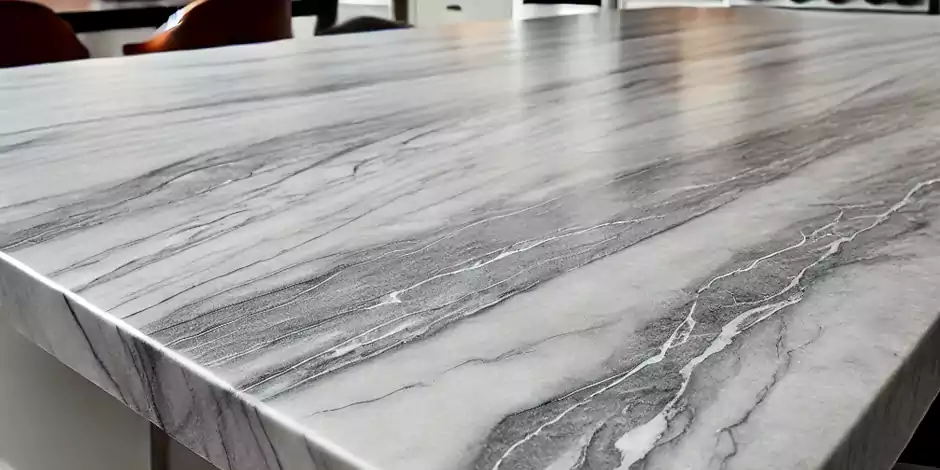
What is the definition of Honed Marble?
Honed marble is a type of marble finish that has a matte or satin-like surface rather than a glossy, polished one. Here are some key characteristics and details What Is Honed Marble Countertops:
- Appearance: Unlike polished marble countertops, which has a shiny, reflective surface, honed marble is more subdued with a smooth, non-reflective finish. This gives it a more natural, less formal look.
- Texture: The honing process involves grinding the marble to create a smooth, flat surface. While it’s not as glossy as polished marble, it still feels smooth to the touch.
- Durability: Honed marble is often considered more durable and suitable for high-traffic areas because it is less likely to show scratches and etching compared to polished marble. The matte finish helps to hide these imperfections.
- Maintenance: Although honed marble is less prone to visible scratches, it can still stain, so it requires regular sealing to protect against spills and moisture. Cleaning should be done with pH-neutral cleaners to avoid damaging the surface.
- Use Cases: Honed marble is commonly used for flooring, countertops, and bathroom vanities. Its understated elegance makes it a popular choice for areas where a softer, more subtle look is desired.
- Variety: Like polished marble, honed marble comes in a variety of colors and patterns, allowing for a wide range of design possibilities.
Honed marble is favored for its timeless and classic appeal, offering a balance between aesthetics and practicality.
Is Honed or Polished Marble Easier to Maintain?
Choosing between honed and polished marble can be challenging, especially when considering maintenance requirements. Both finishes have unique characteristics, and understanding these can help you decide which is better suited for your needs. Here’s a comprehensive look at the maintenance of honed versus polished marble:
Stain Resistance
Polished marble features a high-gloss finish that repels liquids more effectively than honed marble. The smooth, reflective surface of polished marble means spills are less likely to penetrate the stone if cleaned up promptly. This can significantly reduce the risk of staining from everyday kitchen and bathroom spills, such as coffee, wine, and cosmetics. In contrast, honed marble, with its matte finish, is more porous and can absorb liquids more readily, making it more prone to staining. Therefore, regular sealing of honed marble is crucial to prevent stains, especially in high-traffic areas like kitchens and bathrooms. Frequent resealing, typically every six months to a year, can create a protective barrier that minimizes the risk of permanent stains.
Scratch Visibility
Honed marble tends to hide scratches and etches better than repaired marble countertops. The matte finish of honed marble diffuses light, making surface imperfections less noticeable. This quality makes honed marble an excellent choice for busy households with children or pets, as everyday wear and tear are less likely to be evident. Polished marble, on the other hand, reflects light and can highlight scratches and etches, which can mar the surface’s pristine look. Therefore, if you expect your marble surfaces to endure frequent use and potential scratching, honed marble might be the more practical choice.
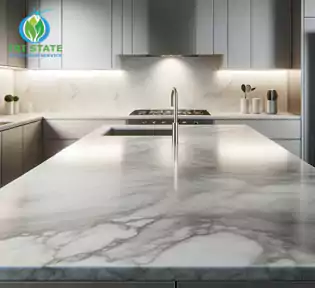
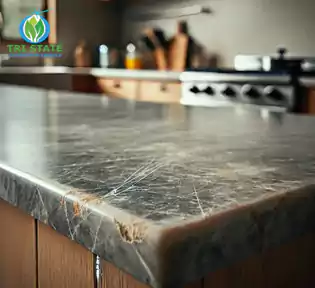
Etching and Chemical Resistance
Both honed and polished marble can etch when exposed to acidic substances like lemon juice, vinegar, or tomato sauce. Etches are generally more visible on polished marble due to its reflective surface, which can make even minor etching noticeable. The matte finish of honed marble can mask etches better, but the stone still needs to be protected from acidic spills. Using coasters and wiping up spills immediately are good practices for both types of finishes. Additionally, regular maintenance with appropriate cleaners can help preserve the stone’s surface and prevent etching.
Cleaning and Maintenance Routine
Polished marble is easier to clean daily because its smooth, glossy surface allows water and cleaning solutions to slide off easily, making it less likely for dirt and grime to stick. Honed marble’s textured surface can trap dirt and grime, requiring more effort to keep clean. This might involve more frequent wiping and the use of specific cleaning agents. For both finishes, using pH-neutral cleaners specifically designed for marble is recommended to avoid damaging the stone. Abrasive or acidic cleaners should be avoided as they can cause etching and dull the surface.
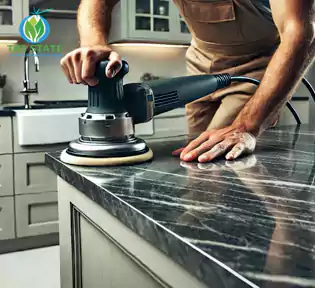
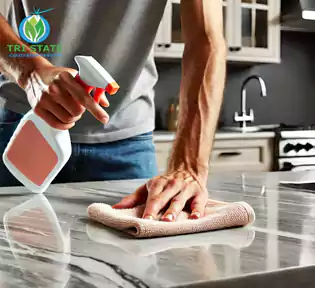
Sealing Requirements
Both honed and polished marble require sealing to protect against stains and etching, but honed marble may need to be sealed more frequently due to its higher porosity. Regular sealing creates a protective barrier, reducing the stone’s vulnerability to stains and etches. Performing a simple water drop test can help determine if your marble needs resealing: if water beads up on the surface, the seal is intact; if it absorbs, it’s time to reseal. This proactive measure ensures the longevity and aesthetic appeal of your marble surfaces, keeping them in excellent condition.
Aesthetic Considerations and Durability
Choosing between honed and polished marble ultimately depends on your aesthetic preferences and the specific needs of your space. What Is Honed Marble Countertops more natural, matte look that can hide imperfections, making it ideal for floors and high-traffic areas. This finish offers a subdued elegance that complements a variety of interior styles, from rustic to contemporary. Polished marble offers a luxurious, high-gloss finish that enhances the stone’s natural veining and color, suitable for decorative surfaces. This finish exudes sophistication and is often chosen for its striking visual appeal. Both types of marble can last a lifetime with proper care and maintenance, adding timeless elegance to your home.
In summary, while polished marble is easier to clean on a daily basis and more resistant to stains, honed marble hides scratches and etches better. Regular maintenance, including sealing and using appropriate cleaners, is essential for both finishes to maintain their beauty and durability. At Tri-State Marble Polishing, we have over 25 years of experience servicing Philadelphia, Bucks County, Montgomery County, and Chester County. If you need expert advice or professional maintenance services for your marble surfaces, contact us today. Let us help you keep your marble looking its best for years to come.
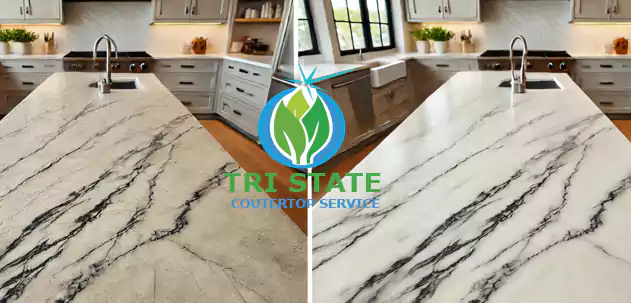

0 comments